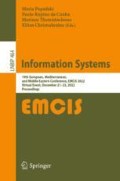Abstract
This work aims to respond to the profound lack of dialogue between citizenship and policy making institutions by proposing a novel solution that enables the transition to inclusive, transparent, accountable and trustworthy deliberation practices. The proposed solution builds on cutting-edge AI tools and technologies to develop a sustainable digital platform, and bridges theories from the fields of argumentation and digital democracy. It may transform scattered islands of emerging knowledge and practices, as well as fragmented discussion threads, into an integrated and coherent dialogue, and provides mechanisms for expanding this dialogue and converting it into tangible actions. Much attention is paid to issues related to knowledge extraction, knowledge graph-based representation of large-scale deliberation, argument mining, aggregation and visualization, as well as to explanation and awareness services about the evolution and outcome of a deliberation.
Access this chapter
Tax calculation will be finalised at checkout
Purchases are for personal use only
References
Androutsopoulou, A., Karacapilidis, N., Loukis, E., Charalabidis, Y.: Combining technocrats’ expertise with public opinion through an innovative e-participation platform.IEEE Trans. Emerg. Top. Comput. 2018 (2018). https://doi.org/10.1109/TETC.2018.2824022
Bodanza, G., Tohmé, F., Auday, M.: Collective argumentation: a survey of aggregation issues around argumentation frameworks. Argument Comput. 8(1), 1–34 (2017)
Cabrio, E., Villata, S.: Five years of argument mining: a data-driven analysis. In: Proceedings of the 27th International Joint Conference on Artificial Intelligence (IJCAI-18), pp. 5427–5433. AAAI Press (2018)
Checkland, P., Holwell, S.: Action research: Its nature and validity. Syst. Pract. Action Res. 11(1), 9–21 (1998)
Christodoulou, S., Karacapilidis, N., Tzagarakis, M.: Exploiting alternative knowledge visualizations and reasoning mechanisms to enhance collaborative decision making. In: Tweedale, J.W., Neves-Silva, R., Jain, L.C., Phillips-Wren, G., Watada, J., Howlett, R.J. (eds.) Intelligent Decision Technology Support in Practice. SIST, vol. 42, pp. 89–106. Springer, Cham (2016). https://doi.org/10.1007/978-3-319-21209-8_6
Devlin, J., Chang, M.-W., Lee, K., Toutanova, K.: BERT: pre-training of deep bidirectional transformers for language understanding. arXiv preprint arXiv:1810.04805 (2018)
Giarelis, N., Kanakaris, N., Karacapilidis, N.: On a novel representation of multiple textual documents in a single graph. In: Czarnowski, I., Howlett, R.J., Jain, L.C. (eds.) IDT 2020. SIST, vol. 193, pp. 105–115. Springer, Singapore (2020). https://doi.org/10.1007/978-981-15-5925-9_9
Hevner, A.R., March, S.T., Park, J., Ram, S.: Design science in information systems research. MIS Q. 28(1), 75–105 (2004)
Karacapilidis, N., Malefaki, S., Charissiadis, A.: A novel framework for augmenting the quality of explanations in recommender systems. Intell. Decis. Technol. J. 11(2), 187–197 (2017)
Karacapilidis, N., Christodoulou, S., Tzagarakis, M., Tsiliki, G., Pappis, C.: Strengthening collaborative data analysis and decision making in web communities. In: Proceedings of the 23rd International World Wide Web Conference (WWW2014), Companion Volume - Workshop on Web Intelligence and Communities, Seoul, Korea, 7–11 April 2014, pp. 1005–1010 (2014)
Karacapilidis N. (ed.): Mastering Data-Intensive Collaboration and Decision Making: Cutting-Edge Research and Practical Applications in the Dicode Project. Studies in Big Data Series, vol. 5, Springer, Heidelberg (2014). https://doi.org/10.1007/978-3-319-02612-1
De Liddo, A., Sándor, Á., Shum, S.B.: Contested collective intelligence: rationale, technologies, and a human-machine annotation study. Comput. Support. Coop. Work 21(4–5), 417–448 (2012)
Lin, H., Liu, Y., Wang, W., Yue, Y., Lin, Z.: Learning entity and relation embeddings for knowledge resolution. Proc. Comput. Sci. 108, 345–354 (2017)
Lippi, M., Torroni, P.: Argumentation mining: state of the art and emerging trends. ACM Trans. Internet Technol. 16, 2 (2016). Article 10. https://doi.org/10.1145/2850417
Liu, B.S., Zhou, Q., Ding, R.X., Palomares, I., Herrera, F.: Large-scale group decision making model based on social network analysis: trust relationship-based conflict detection and elimination. Eur. J. Oper. Res. 275(2), 737–754 (2019)
Peters, M., et al.: Deep contextualized word representations. In: Proceedings of the 2018 Conference of the North American Chapter of the Association for Computational Linguistics, vol. 1, pp. 2227–2237 (2018)
Rapoport, R.N.: Three dilemmas in action research. Hum. Relat. 23(6), 499–513 (1970)
Samek, W., Montavon, G., Vedaldi, A., Hansen, L.K., Müller, K.-R. (eds.): Explainable AI: Interpreting, Explaining and Visualizing Deep Learning. Springer, Heidelberg (2019). https://doi.org/10.1007/978-3-030-28954-6
Tang, M., Liao, H.: From conventional group decision making to large-scale group decision making: what are the challenges and how to meet them in big data era? A state-of-the-art survey. Omega 102141 (2019). https://doi.org/10.1016/j.omega.2019.102141
Wang, Q., Mao, Z., Wang, B., Guo, L.: Knowledge graph embedding: a survey of approaches and applications. IEEE Trans. Knowl. Data Eng. 29(12), 2724–2743 (2017)
Wang, Z., Zhang, J., Feng, J., Chen, Z.: Knowledge graph embedding by translating on hyperplanes. In: Proceedings of AAAI 2014, pp. 1112–1119 (2014)
Author information
Authors and Affiliations
Corresponding author
Editor information
Editors and Affiliations
Rights and permissions
Copyright information
© 2023 The Author(s), under exclusive license to Springer Nature Switzerland AG
About this paper
Cite this paper
Karacapilidis, N., Tsakalidis, D., Domalis, G. (2023). An AI-Enhanced Solution for Large-Scale Deliberation Mapping and Explainable Reasoning. In: Papadaki, M., Rupino da Cunha, P., Themistocleous, M., Christodoulou, K. (eds) Information Systems. EMCIS 2022. Lecture Notes in Business Information Processing, vol 464. Springer, Cham. https://doi.org/10.1007/978-3-031-30694-5_23
Download citation
DOI: https://doi.org/10.1007/978-3-031-30694-5_23
Published:
Publisher Name: Springer, Cham
Print ISBN: 978-3-031-30693-8
Online ISBN: 978-3-031-30694-5
eBook Packages: Computer ScienceComputer Science (R0)

